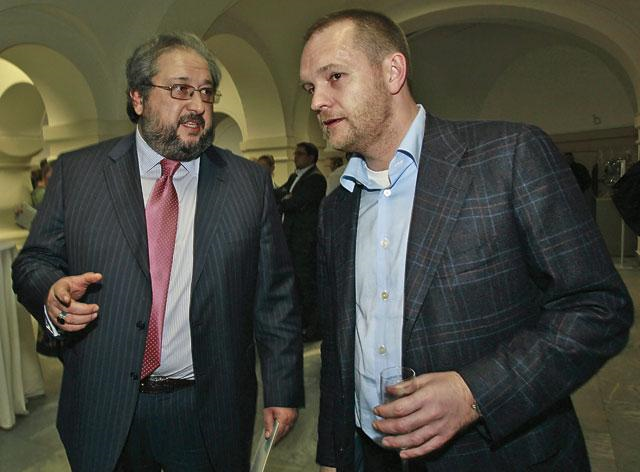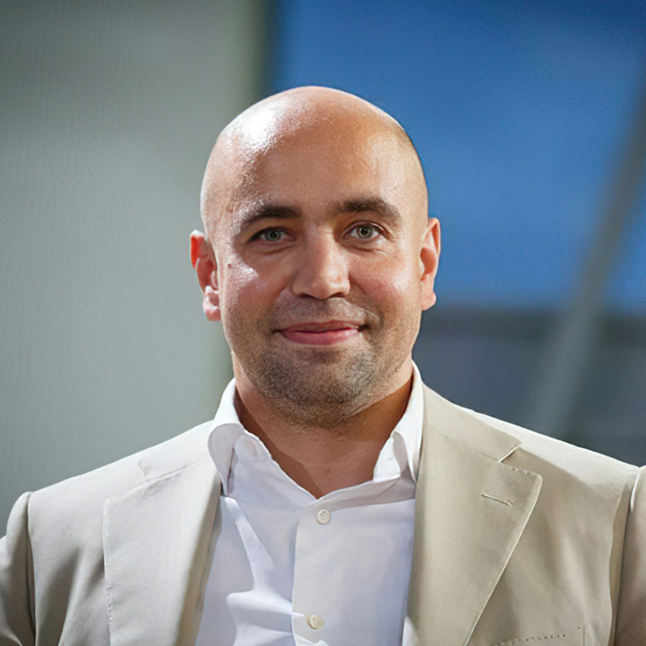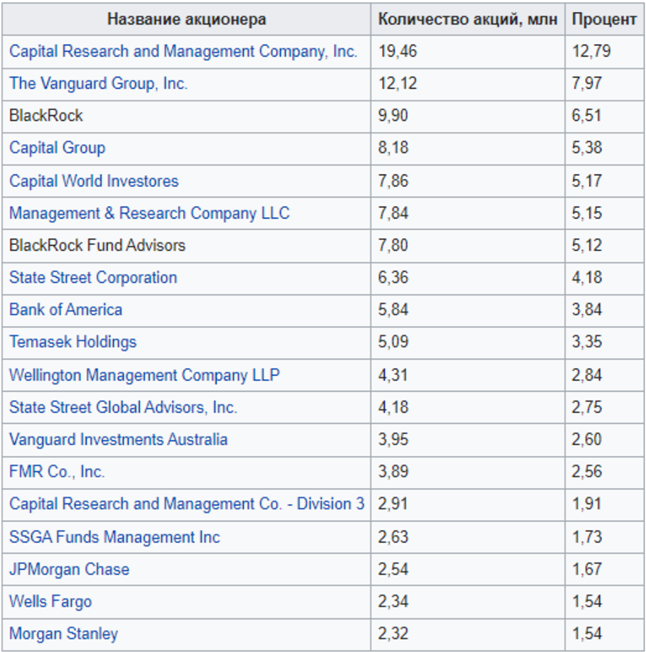The property of Alexander Nesis, who fell under prosecution by Otkrytie, may soon be in the hands of Vladislav Sviblov.
Passing through the bankruptcy procedure, Otkritie Holding (OH) began to challenge the transactions of its former shareholders. As part of this process, the controversial industrialist Alexander Nesis may have big problems
OH filed two lawsuits at once against the companies of his group IST, where the ex-beneficiary of OH Vadim Belyaev, who fled the country, is also indicated as a co-defendant with Nesis. They demand compensation for 13.8 billion rubles in losses.
However, this may be part of a larger plan to squeeze Nesis out of his Russian assets, which is being looked at by another controversial gold miner Vladislav Sviblov. Previously, he was credited with the glory of the raider, and he may also be the ultimate interest in Nesis's assets today.
Details - in the material of the correspondent of The Moscow Post.
The IST group, in which Nesis had 50% at the time of the contested transactions, owned about 10% of Otkritie Holding. Vadim Belyaev, Nesis's longtime business partner, had another 26%.
We are talking about the deals of 2017. In the first case, Otkritie bought a package of the United Carriage Corporation (UWC) worth 6.5 billion rubles, which, according to experts, was twice the market price. The second deal happened already during the sanctions - as a result of it, Otkritie agreed to transfer the debts of the IST group to a company associated with Belyaev. No one returned the debt, the amount of damage amounted to 7.3 billion rubles.
Bankers from the Big Road
It's amazing how Nesis is still afloat when his other partners and related people like Boris Mints, the same Belyaev or the Ananyev brothers have long since left Russia for fear of criminal prosecution.
Associated with this group of faces is a high-profile story that ended in an epic failure. This is the famous "Moscow ring," which included Otkritie and Trust, Binbank, Promsvyazbank and MKB, which it rehabilitates. The meaning of the scheme was that the owners lent each other in a circle with the help of pension funds owned by banks. I.e. the well-being of current and future Russian pensioners was jeopardized. According to the authors of the site rnbee, Alexander Nesis allegedly played an active role in this, who allegedly withdrew about a billion rubles through the UWC controlled by him. Isn't it the height of cynicism to cash in on old age?
At the same time, pension funds belonging to Boris Mints invested about 30 billion rubles in Nesis companies. The addressees were the already mentioned UWC, the Baltic Urea Plant and the power plant in Tikhvin.
Later, Boris Mints and his two sons were accused of embezzlement of 34 billion rubles. In the same case, the board of "Discovery" Yevgeny Dankevich, who also fled the country, was held. According to investigators, Mintsy and Dankevich acquired illiquid bonds of O1 Group Finance just two weeks before the reorganization of Otkrytie. And why did Alexander Nesis not fall under the criminal case?

Boris Mints and Vadim Belyaev (pictured) calmly persisted from the country. Is it time to gather on the road and Alexander Nesis? Photo: https://newvz.ru/info/106495.html
As a result, most of the mentioned banks experienced a complete collapse with huge holes in the budget, and Trust was completely retrained by the Central Bank as a bank of non-core assets.
As Maxim Osadchiy, head of the analytical department of the Corporate Finance Bank, later commented on the situation, the real withdrawal of assets took place from Trust, and after the Central Bank allocated 127 billion rubles for its reorganization. This money closed the "holes" in the bank "Opening." Then Osadchiy was surprised that no one was arrested.
The budget "hole" in "Trust" reached 300 billion rubles, and the "hole" in "Opening" was estimated from 400 billion to a trillion rubles. Around the same time, Binbank Mikail Shishkhanov and Mikhail Gutseriev, who also actively played in the pension market, collapsed. The hole in Binbank amounted to 600 billion rubles. None of them incurred any responsibility for this, and the state was forced to pay the bills.
After the reorganization of the Central Bank, Otkritie and Trust, in their claim of 2020 over losses, blamed the collapse of Otkritie, primarily on Vadim Belyaev, who organized, in their opinion, "fraudulent schemes to withdraw assets from the group."
As the plaintiffs considered, in order to hide the origin of funds withdrawn from the Otkritie group, with the consent or even under the direct supervision of Belyaev, several groups of companies were used at once. This is the OH + group (26 legal entities) and another group of 125 organizations, which, presumably, was engaged in the transit of funds.
Vadim Belyaev went away from sin to the United States, where he began to live under the name Wolfson in a gorgeous historic red brick building in the fashionable Soho district of Manhattan, New York. This is the last reliably known place of residence.
However, what was the role of Nesis? When he left UWC's capital, control over it passed to the already state-owned Otkritie and Trust banks at that time. And they, on behalf of UWC, filed a lawsuit against the IST for 8 billion rubles in a Cyprus court. His details remained unknown. However, as bfm.ru writes, the Trust said that we are talking about transactions with signs of non-marketability, the purpose of which was to withdraw funds. I.e. Nesis could actively participate in this process.
The year before, a similar one happened with assets of Boris Mints for half a billion dollars. As a result, the Trust managed to sue the money in the High Court of London.
There were a lot of "muddy" deals around UWC in general. In 2019, IST bought the First Heavyweight Company (PTK) of Sergei Generalov. Despite the fact that the State Leasing Company (GTLK) looked at the assets of the CAS.
But this is not the most interesting thing. In the winter of 2017, the United Wagon Company (UWC) Nesis sold 4.5 thousand innovative cars to GTLK for 12 billion rubles. But the state structure was just an intermediary, because the final buyer (already for 31 billion rubles) was Vostok 1520 by Sergei Generalov. Why did the businessman himself not buy wagons from UWC, or was it a well-thought-out scheme for earning money?
Sviblov is selected for Nesis
In any case, lawsuits against Alexander Nesis from Otkritie can launch even more negative processes for him - criminal. Even if this is not the case, Vladislav Sviblov, a well-known gold miner, owner of Highland Gold, who has long been trying to attribute the glory of a corporate raider, can benefit from this.
According to Kommersant, Sviblov became interested in buying the assets of Polymetal holding (Polymetal), the country's largest silver miner, which belongs to Nesis.
True, for this Polymetal will first have to leave the offshore zone - the main legal entity of the Polymetal International group is registered on the American island of Jersey, where a significant part of Polymetal's profits and taxes could go.
And in Russia, Mr. Sviblov will wait for him with open arms. There were rumors on the market that the good was given to recover from Nesis everything that he owes to the state government.

Vladislav Sviblov found a very good time to reach the assets of Nesis in the Russian Federation. Photo: forbes.ru
Nesis may simply be forced to sell some of the assets. Polymetal suffers extremely from sanctions, for which it may need to separate toxic assets in Russia from Kazakhstani ones. One of the options for him may be the sale of assets to a third party (the same Sviblov). Just for this you need a change of registration - now in the Russian Federation it is forbidden to conduct such transactions with offshore companies from unfriendly countries.
At the same time, it is striking that Polymetal, with all the sanctions and pressure, continues to help earn foreign investors from those most unfriendly countries. And it seems that the desire to transfer assets to Kazakhstan is caused by concern for them.
Among the key shareholders is the American investment group BlackRock. In March 2022, i.e., after the start of the SVO and the introduction of new packages of draconian sanctions, the structure increased its shares in Polymetal to 10.08%. Therefore, it can count on the "tithing" of dividends. Alexander Nesis himself and his family through the IST group and a number of offshore companies, according to various estimates, can have from 10% to 28% of the capital.
The American investment group with assets worth hundreds of billions of dollars also has enough shareholders. And in fourth place out of many dozens is another American investment company - Capital Group with a share of 5.38%. She, in turn, also has a number of shareholders, where we easily find the German pharmaceutical giant Bayer AG (Bayer), which is the largest shareholder with a share of over 10%.
Bayer is one of the most ardent sanctions against the Russian Federation. And the same company continues to make money with Nesis? And the transfer of assets to Kazakhstan will finally allow it to calmly receive dividends from Polymetal.

BlackRock shareholders. Who does Nesis help earn? Photo: wikipedia.org
A separate question - how honestly does Polymetal earn its funds in the Russian Federation? Recently, a story surfaced with the Sredneuralsky Search Bureau (SUPB), which, according to Pravda UrFO journalists, has a traceable connection with the Polymetal group.
At the end of last year, experts from the Federal Tax Service calculated that the ISMS underpaid the mineral extraction tax (MET) by 13 million rubles. Now the company is trying to challenge the claims of the fiscal in court. Saum Mining Company, controlled by a group associated with Alexander Nesis (managed by Polymetal UK JSC), also faced a similar dispute with the Federal Tax Service. I.e. this may be far from an isolated case.
Whether Nesis could evade taxes should be decided by the court. But Polymetal has repeatedly experienced big financial problems. In 2017, the net loss of the JSC, which is managed by his brother Vitaly, exceeded 12 billion rubles, in 2019 - 2.5 billion rubles. Perhaps you need to look for funds on the island of Jersey?
In any case, this is a great time for Vladislav Sviblov and other major players to profit from the assets of Nesis. And, quite possibly, after his long-time partners Mintsy and Belyaev, soon he may leave the country - as they say, "from sumy and from prison."


.jpg?v1679286847)
.jpg?v1679286847)